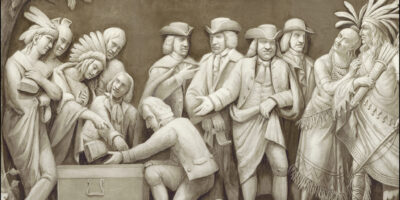Simon Newcomb and the Let-Alone Principle
Wherever we turn, there are some people who are busy telling the rest of us how we should live; with whom we should interact, and under what circumstances; how much we should be paid, and where and how we may work and produce; what we should pay for something we want to buy, and how it can be manufactured before we purchase it. They want to police our words, surveil our actions, and manipulate our thoughts. These people will just not leave us alone.
What we desperately need is the case for being peacefully and freely left alone, with others minding their own business rather than insisting upon putting the government’s nose into ours. About 150 years ago, just such a case was made by a well-known astronomer and political economist, Simon Newcomb (1835-1909), who for many years was a professor at Johns Hopkins University.
In January 1870, Newcomb published the lead article in the pages of the North American Review, precisely with the title “The Let-Alone Principle,” concerning the role of government in society.
Right of Each Individual to Live His Own Way
It is worthwhile, perhaps, to reconsider the reasoning and the reasonableness of Newcomb’s argument in the context of our own time when those possessing or wanting political power refuse to leave us alone. Simon Newcomb began by reminding his readers of what he considered a commonsense truth:
That each individual member of society should be left free to seek his own good in the way that he may deem best, and required only to not interfere with the equal rights of his fellow-men, is an idea so simple that it might be supposed that no man could not misunderstand it, whether he accepted it or not.…
The let-alone principle may be regarded either as a declaration of rights or as a maxim of political policy.… In the first case, the principle declares that society has no right to prevent any individual who is capable of taking care of himself from seeking his own good in the way he deems best, so long as he does not infringe on the rights of his fellow-men. In the second case, the principle forms the basis of a certain theory of governmental policy, according to which the political system is most conducive to the public good in which the rightful liberty of the individual is least abridged.
Newcomb dispelled a number of common objections to the let-alone principle. First, he explained that being left alone does not mean the individual can do anything he pleases, with no regard for others. The very notion of an individual’s basic, or “natural,” right to his own life and liberty to act as he chooses requires a reciprocal recognition of the equivalent individual rights belonging to all others.
Second, he explained that such individual’s right to liberty also includes the expectation and requirement to fulfill any and all voluntary contractual arrangements and agreements into which he may have entered. To fail to do so amounts to an act of theft against another, in not reciprocally doing or giving that which was agreed to.
And, third, he explained that some payment will have to be made to support the ability of a limited government to perform its tasks of securing and protecting the rights of each individual member of society.
Self-Governance and Limited Government
Given the great experiment with political self-government in the United States, Newcomb warned that even though America’s republican form of government meant that the people ruled themselves rather than being compelled to obey a king or conqueror, unrestrained political majorities can be as potentially tyrannical as the most absolute monarch. Said Newcomb:
An idea seems to prevail that the principal object of government is to enable the majority to carry out its views.… But it needs only a consideration of first principles to make it plain that the main object of government is the protection of minorities, especially those most powerless minorities, individuals.…
We sympathize warmly with people whose natural rights are abridged by the government of an emperor or an aristocracy; but … it makes little difference to the minority or to any particular individual whether those rights are disregarded by a despot, a highwayman, or a majority of his fellow-citizens, wielding the powers of government.
Newcomb went on to emphasize that at the bottom of it all is a fundamental and inescapable question. Who knows better how to run your life — you or others in government? Said Newcomb:
The real point in dispute between the friends and the opponents of free government and individual liberty is simply this: Is man a being to take care of, or is he able when protected in his rights to take care of himself better than any governing power — congress, king or parliament — can take care of him? The advocates of universal freedom claim that, if each man is protected in the enjoyment of his individual rights as a responsible member of the community, he can take care of himself, and manage both his own affairs and his share of the public affairs better than anyone else can do these for him.
Protective Tariffs vs. Leaving People Alone
Newcomb asked, what might be examples of democratic majorities interfering with the legitimate rights of individuals in society? One that is timely in its relevance for today as much as in 1870 is the protective tariff. Another was usury laws, under which the government imposes mandatory limits on the interest rates under which savers and borrowers can agree to lend and borrow sums of money across time. And a third, Newcomb argued, was legal tender laws, with the government insisting that some items were to be considered lawful means of exchange and settling debts, while any others are prohibited or suppressed.
Fundamental to the freedom of any individual is his right to enter into transactions and exchanges with whomever he finds it advantageous for mutual benefit, as long as it does not infringe upon the equivalent individual rights of any third party. The protective tariff is a government intervention not meant to simply raise revenues to support the basic functions of government with minimal interference with free market interactions.
It is intentionally designed with the purpose of partly or entirely restricting the importing of some good to “protect” a domestic producer from a more unrestrained competition of foreign rivals attempting to sell their product in the country in question. Newcomb reasoned:
The argument against such taxes is this: If you conceive it to be for your interest to buy your coat from a foreign tailor, and to pay him what he is willing to accept as an equivalent, you do not, in acting on this conviction, interfere with any right of any other human being. You only exercise your own natural right of disposing of the products of your labor in the way you judge most to your advantage, and by that act no right of your American tailor is violated. On what ground can he claim your custom, against what you believe to be your interest?
You make no objection to your protectionist neighbors buying their clothes where they see fit, and repelling with all their energy the avalanche of cheap clothing which the foreign paupers are trying to pour into them; why should you not be allowed the same privilege?
That the seller of the domestic version of a product may lose out to his foreign competitor is part of the very nature and desirable working of a free and open economic system based on individual liberty. Either sellers must obtain the voluntary consent of those with whom they trade, or they turn to the use of the government power to impose terms of trade on those who otherwise would not have agreed to them; and the buyers in that society are restricted and plundered by the successful uses of the government by those who wish to violate the principle of freedom of association.
In turn, all are made poorer in that society by compelling some to pay more for what they could have obtained from abroad for a lesser price. That which could have been obtained from suppliers in foreign lands at better terms must now be acquired from the productions at home with a greater expenditure of inputs to gain the same amounts of outputs, which reduces the total amount of what could have been obtained from the available means to all our desired ends through a better and more efficient combination of domestic production and international trade.
Usury Laws as Price Controls
This logic of liberty was no less true, Newcomb said, when applied to the issue of usury laws. He considered it “a relic of barbarism” from an earlier dark age for governments to presume to dictate the terms under which individuals may contract with each other as lenders and borrowers. No one freely enters into an exchange unless each participant considers what he is getting to be of greater value than what he is asked to part with in the transaction to get it. The lender must prefer the future interest income offered for parting with a sum of his savings for a period of time; and the borrower must prefer the use of this sum of money for a period of time nearer to the present than the interest income he has promised to pay (along with the principal) at some future date.
“The transaction does no harm to anybody else,” concluded Newcomb. “It fulfills all the conditions of a valid and rightful contract, and government does a wrong in stepping in to release [the borrower] from his obligation” to repay the loan on the terms agreed upon.
Furthermore, Newcomb reminded his readers, a central role of market prices is to efficiently allocate supplies to where they are most desired. A rising price acts as an inducement to reallocate part of the existing supply of a good in the direction of the greater demand reflected in that higher price; and the higher price serves as an additional motivator to possibly increase the overall supply of that good available on the market in general over time.
The same applies to the market prices for borrowing and lending, the rates of interest. Imposing maximum limits on interest rates that may be charged not only prevents scarce savings from being reallocated to where they are most urgently needed, as reflected by the price offered for them. It also drives desperate people into the shadow world of black market lending, where the less scrupulous and the more dangerous do their business. (See my article “Interest Rates Need to Tell the Truth.”)
Legal Tender Laws Violate Freedom of Choice
In the third example of unjustifiable government intervention, the political authority had no business restricting or prohibiting the rights of individuals of entering into any peaceful and voluntary contractual obligation of their own choosing concerning the means of meeting the terms of the agreements concerning a method of payment. Legal tender laws violate this principle when the government attempts to impose a means of payment on the transactors different than the one to which they have mutually agreed, or which changes the defined relative amount of the means of payment as consented to and understood by the traders in their original agreement.
Newcomb, at the time he was writing, had in mind the fact that prior to the American Civil War, monetary contracts were understood in general to mean payments in certain sums of gold as the lawful money. But with the introduction of fiat, or paper, currency during the Civil War to cover portions of the federal government’s war expenditures, the courts began to define lawful payment to be paper dollars possessing a purchasing power noticeably less than the exchange value of gold in the original market contracts. This ex post redefining of means of payment in depreciated paper currency was considered a clear violation of people’s rights to decide how and in what to trade, and at what relative values as agreed to by the parties themselves.
In advocating freeing money and banking from the clutches of government and central bank control, Newcomb warned: “The truth is, the let-alone policy with regard to the currency has hardly ever had a fair trial by civilized nations. It is always possible to persuade a large fraction of the public that their interests will be advanced by legislative meddling with the currency, and there are always so many persons who may make money by that meddling, that it is sure of vigorous support.”
After the paper-money inflation of the Civil War (which had ended about five years before Newcomb published his article), he called for the restoration of gold payments for all outstanding banknotes in circulation, especially for the national banks brought into existence during the conflict. These banks were meant to fund the federal government’s war costs by using the government debt sold to them as the basis upon which these privileged banks then created paper currencies put into circulation with the government debt as its legal backing.
Newcomb, instead, called for free banking, with no government restrictions on private competitive banking, including any government-fixed ratio of reserve requirements on banknotes outstanding. Let the market decide the appropriate ratio of gold reserves to currency outstanding, he said, given the demand by depositors to use and hold any bank’s notes. But make sure, Newcomb insisted, that there are “the severest penalties on any bank which shall fail, on any pretext whatever, to make good its obligations in [gold] coin.” And, finally, he called for letting the market set interest rates, rather than that being done by legislators ignorant of the working of markets and susceptible to political pressures.
Newcomb’s Argument and Protective Tariffs Today
Simon Newcomb’s three examples all have their counterparts in our current political environment. In contemporary America, the president of the United States is dedicated to determining the forms and directions of international trade between America and the rest of the world. By executive fiat, he imposes or threatens to impose import taxes of various and varying amounts on the goods of other countries with whom the people in the United States have networks of intricate supply chains of interdependency: from the originating raw materials through the intermediate goods by which manufacturing is undertaken, to the final and finished goods and services bought and used by multitudes of producers and consumers, individual Americans have made and continue to make exchanges with those with whom they have reached voluntary and mutually agreeable terms of trade, including many producers and suppliers in other parts of the world. But the president seems determined to rend them apart, as he thinks best.
Donald Trump is unwilling to leave people and their peaceful market associations alone. By doing so, he violates the fundamental premise of individual rights and liberty which the United States was supposed to be founded upon and following. President Trump is certainly not the first chief executive of the U.S. government to introduce or follow such policies. And, unfortunately, he is not likely to be the last. But what stands out in Trump’s statements and actions is the conscious and declared disregard that his trade-warring policies run counter to the idea of personal liberty. Indeed, he seems to relish referring to the “greatness” of the nation, separate from and more important than the actual individual Americans who are the citizens of the country.
Usury Laws and Federal Reserve Interest Rate Policy
Even now, 150 years after Newcomb’s criticisms of usury laws (in which he really only repeated part of the arguments made already in Jeremy Bentham’s “Defense of Usury” in 1787), government interest rate–ceiling laws exist in all the states around the U.S. For example, in Alabama the legal interest rate charge is 8 percent; in Alaska, 10.5 percent; in Arizona without a written contract, 10 percent; in California, between 7 and 10 percent; in Connecticut, 12 percent; in Washington, D.C., 24 percent (clearly under the presumption that politicians in the nation’s capital who need personal financing can always find ways to get more money — from their special-interest friends, no doubt — to pay their personal high interest rate charges!); in Illinois, 9 percent; in Kentucky, 8 percent; in Massachusetts, 6 percent; well, in fact, the list goes on and on, because each and every state in the Union has a legal usury maximum.
But there is another interest rate intervention that is in the spirit of Newcomb’s criticisms that reasonably should not be ignored. And this is the Federal Reserve’s interest rate manipulation. For America’s central bank (in fact, for every central bank almost anywhere around the world), interest rates are not treated as market-originated and market-established prices bringing about a competitive coordination of the decisions of savers and borrowers concerning the intertemporal transfer and use of money and the real resources that money represents in the marketplace.
Instead, interest rates — which are supposed to balance the use of resources between the present and the future, given the scarcity of the means to achieve our various desired ends — are viewed by central bankers as policy tools to influence and set to bring about supposed macroeconomic levels of general output and employment of labor. It is price fixing by monetary central-planning fiat, which undermines the effective functioning of a crucial market for economic stability and sustainable growth and rising standards of living.
Finally, legal tender laws continue to interfere with the free and voluntary choices of market participants. In this context, I mean the recent threats to undermine or overturn the attempts by those outside of government to offer potential monetary alternatives to government monopoly monies. It is not a matter of whether Bitcoin is or is not a workable and functioning potential medium of exchange or whether or not Facebook’s proposed cryptocurrency, “Libra,” will actually be launched and be successful by drawing upon the estimated 1.5 billion users of its social media site.
It is a matter of the determination of the governments and their central banking institutions to impede, prevent, or co-opt the freedom of possibly millions or even billions of people to use monies of their own choice to facilitate the business of buying and selling within and between countries on the political maps of the world. How else can governments prevent the private competition that would undermine their monopoly power to manipulate currencies, distort prices, fund their budget deficits through fiat-money creation, and plunder untold numbers of people through the process of inflation? No, the political magicians do not want to lose their monetary magic wands.
In Principle and Practice, the Let-Alone Principle Is Best
Simon Newcomb ended his discussion of the let-alone principle by saying that it is always possible to create hypothetical scenarios in which it can be shown that in a particular situation individuals might not always seem better at managing their own affairs than someone else for them. But that in no way undermines the reasonableness and rationale of leaving people to guide their own lives. It would be necessary to demonstrate, just on pragmatic grounds, that those in the political realm who would usurp such authority over people’s decision-making, in fact, had the knowledge and ability to direct others in their everyday affairs; and that any attempt to do so would not make the situation worse than if the government let it alone, instead of interfering. Or as Newcomb expressed it:
We have endeavored to show that the let-alone policy is of wider application than many are willing to admit, and that individuals may safely be left to take care of themselves in cases where they have been supposed peculiarly to need the supervision of government. At the same time we have taken care to set it forth, not as a principle universal and necessary, but only as affording the best attainable rule of conduct for governments, a departure from which will open the road to so many complications and abuses that the best course is to adhere to it as a principle.…
One of the propositions [of the let-alone principle] is, that the individual is a better judge than government of what is the best employment for his capital and labor. Let us grant the possibility of cases in which the reverse would be true — rare though they must be. It does not follow that it is advisable for government to rush in and “regulate” the business of the individual. It must first be shown that government can practically employ greater wisdom, in directing and restraining the individual as to his interest, than he can himself command, and it must be further shown that the act of interference will not bring in its train greater evils than those it is designed to remedy.…
It will so frequently be found that, after all, the individual was right and the government wrong; and all interference is so apt to lead to unforeseen complications — that the best course for a government to follow is, to adhere to the let-alone policy as a matter of principle.
Simon Newcomb’s conclusions, after a century and a half more of failed government interferences of almost every imaginable form and type, stand as even more reasonable than when he penned them: those in government should simply leave people alone.











